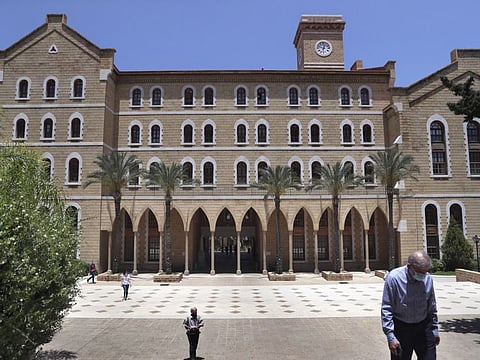Lebanon’s crisis, COVID-19 hit American University in Beirut
Many parents have been unable to afford school, and university fees charged in dollars

Beirut: One of the Arab world’s oldest and most prestigious universities, which endured civil war, kidnappings and various economic crises, is preparing for what may be the biggest challenge in its 154-year history.
The American University of Beirut is confronting a global pandemic, a severe recession and the collapse of Lebanon’s currency - all at the same time - and is planning a series of sweeping layoffs and salary cuts in response.
AUB president Fadlo Khuri said the school, which ranks among the top 150 in the world, will lay off up to 25 per cent of its workforce, close administrative departments and shelve an ambitious project for a major new medical centre.
“The layoffs are very painful,” Khuri told The Associated Press in an interview at the sprawling campus on the Mediterranean Sea. “AUB has never had to do this before, we’ve never been forced to have layoffs.”
Also Read: More protests as Lebanese pound hits new low
The announcement has come as a shock to members of the 6,500-strong workforce of AUB and the American University Medical Centre. Tens of thousands of Lebanese have already lost their jobs in a worsening economic crisis exacerbated by the coronavirus outbreak.
The crisis is rooted in decades of institutionalised corruption and mismanagement that came to a head last October, igniting mass protests. The economic meltdown has plunged the fragile country into deep uncertainty and threatens to unleash further unrest and chaos.
Squeezed
Unemployment has skyrocketed to 35 per cent, and nearly half the population lives below the poverty line, according to the World Bank.
The crisis has also squeezed the middle class. Lebanese, who have long used the dollar and the Lebanese pound interchangeably, have seen the local currency lose nearly 70 per cent of its value. With incomes and savings evaporating, many parents have been unable to afford school, and university fees charged in dollars.
Khuri first laid out the painful reality in a memo to staff on May 5, describing the situation as a “confluence of calamities” that he said together amount to the “greatest crisis since the university’s foundation in 1866.”
He said the university had expected to raise $609 million in revenue for 2019 and 2020, but instead faces real losses of $30 million, an amount that would almost totally wipe out contingency funds it has built up since 2015.
In a June 15 memo, he announced there would be a series of unprecedented layoffs to help cope with the crisis. Khuri told the AP the decision was “very difficult personally” but aims at making AUB more sustainable.
The American University of Beirut, which operates under a charter from the state of New York, was the first to introduce American education to the Middle East. For generations, it has educated the Arab world’s elite, produced three presidents, around a dozen prime ministers - including current premier Hassan Diab - and countless Cabinet ministers and ambassadors. It currently enrols around 9,250 students.
Assassinated
The university remained open throughout much of the 1975-1990 Lebanese civil war, providing an oasis of calm and greenery even as a number of foreign staff members were kidnapped or killed, including president Malcom Kerr who was assassinated in 1984 and David Dodge who was acting university president when he was kidnapped by pro-Iranian gunmen in 1982. He was released a year later in Iran. International and local faculty and students joined waves of Lebanese who fled the country’s recurring conflicts.
The university closed down when the coronavirus pandemic hit in March, but it has partially reopened for summer classes.
Khuri said the current crisis is very different than what happened during the civil war, when the Central Bank and government still had resources that could stabilise the situation.
“What happened during the civil war is that the Lebanese state disintegrated but the Lebanese government still had resources,” Khuri said. “Right now, what you have is a perfect storm.”
Khuri, who has expressed support for the demands of the protest movement, said the system in Lebanon needs to fundamentally change. He hopes that the aspirations of young Lebanese who took to the streets in October last year will be heard.
“The poison in the American constitution was slavery, the poison in the Lebanese constitution is sectarianism,” he said.
Concerns
Lebanon’s communal power-sharing system, established since the country’s independence from France, distributes top government posts according to sect and has spawned widespread corruption and political paralysis.
Khuri, who was born in Boston and brought up in Beirut, where he attended AUB in the early 1980s, said he was concerned that when Beirut airport reopens after the coronavirus shutdown, even more of Lebanon’s best and brightest will emigrate.
He said a strong AUB is the best hope for the people of Lebanon and the Arab world, to help develop the region’s future leaders - another reason to take tough measures.
“It’s a very bitter cup to drink, but we don’t get to choose our battles in life, and unfortunately this is the one that I’ve inherited,” he said.
Sign up for the Daily Briefing
Get the latest news and updates straight to your inbox









